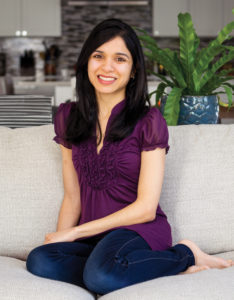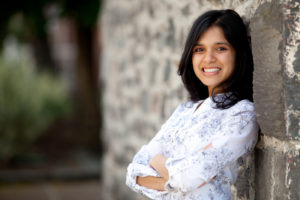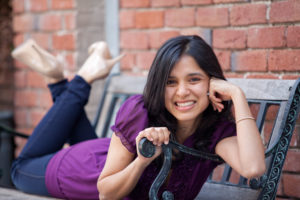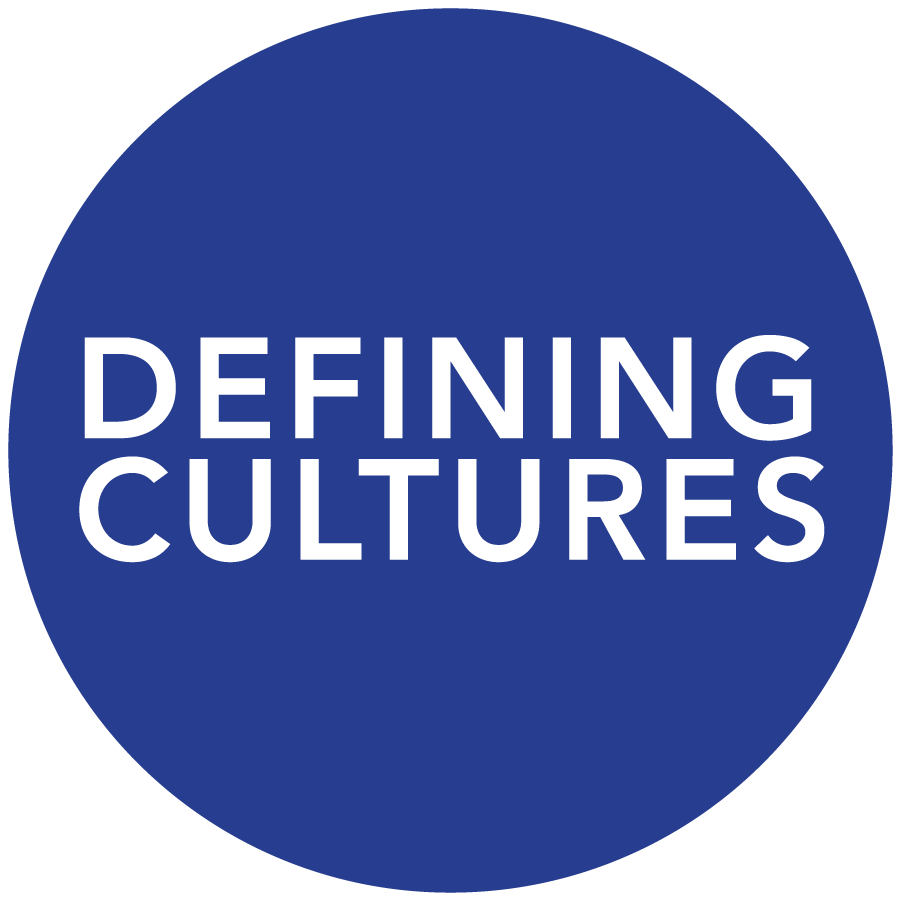
Anjali Shah, a Board Certified Health Coach and Food Blogger, welcomed others to her journey when she launched The Picky Eater Blog in 2010.
She admits that she didn't know how to cook prior to tying the knot, and personally faced two options once married: either inheriting her husband’s fast food lifestyle or learning how to cook. She wasn’t down with the ‘fast food life,’ so she chose the latter and has since transformed her husband into a healthy eater. Anjali also credits her “picky” preference of eating healthy foods, and junk in moderation, as inspiration behind her easy to make, tasty and fun recipes.
When I think of Anjali, I’m impressed with her passion and love for sharing personal recipes with the world. Especially ethnic dishes that are able to expand our taste buds.
She is a first-generation American who incorporates an appreciation of diversity through food. To date, Anjali has shared around 300 recipes on her blog, evenly divided among Indian, Middle Eastern, Italian, Mexican/Spanish and Asian/Thai-inspired creations.
But how did she get to this point in life? This interview will take you from her upbringing as an Indian-American to where she is now – recognizing her cultural identity as a never-ending evolution.
• “It was difficult at times. I think a lot of first-generation Indians struggle between balancing their South Asian heritage with wanting to fit in.” •
- Anjali on her cultural identity in high school
What led your parents to America?
My dad was an Engineer and got a job in the U.S. He was already married to my mom who was a Psychologist in India, but became a teacher here. They came to the Bay Area and never left.
Were you born and raised in the Bay Area?
Yea, in South Bay. About 45 minutes south of San Francisco.
Would you consider your environment pretty diverse growing up?
No. Back then, the whole Bay Area was predominately White. But now, it’s predominately Asian. In terms of underrepresented populations like Black people and Latinos, there’s not many in the South Bay Area where I grew up.
So your schools were predominately White?
Yes. I was the only non-White kid in my [private] elementary school…I was basically the only person of color in K through 8. And then I went to a public elementary school, it was about 5 of us.
High school was the same-ish…it was 15 Indian students out of 1,000, but there were Asian, Black and Latino kids too that I’m not counting. Overall it was probably still like 80-90% White, so not as White as my elementary school.
How did your parents try to make sure that you retained your Indian culture?
They came to the U.S. five years before I was born, so they had already established a community of expats from India. Their circle of friends was predominately Indian, but also included other Asians and White people…and I grew up with all those kids. Whenever we did anything family/friends related, it was always Indian/Asian people, but if I was doing anything with friends at school, it was all White people.
How did you feel being in a predominately White school?
It was difficult at times. I think a lot of first-generation Indians struggle between balancing their South Asian heritage with wanting to fit in. Culturally, things are really different for how Indian parents raise their kids vs. how White parents raise their kids. So the little things: what my hair looked like, whether I was allowed to wear makeup, whether I was allowed to go on dates…what am I bringing to school for lunch? If my mom sends me to school with Indian food, it smells different and looks different. All that stuff. It’s not like I was eating Indian food everyday, but the occasions I did I would have thoughts of: “should I throw my lunch away?” All the little things that you can get picked on at school for being different, you just had to be a lot more aware of it.
Luckily my parents were more progressive than most Indian parents of their generation, so I wasn’t banned from going to school dances. I went to prom, I played sports, did school activities. Whereas, I knew a lot of Indian girls whose mom would never let them be a cheerleader for example. My parents had no problem with that. So in some context it was fine…
Did you ever get picked on?
...I don’t know if it was overt, but it was like I was never ‘one of them.’ I was pretty savvy as a teenager and figured out how to fit in pretty well, despite having no resources to teach me how to do that in my home life. I didn’t really get explicitly picked on, but my parents didn’t understand how teenagers in America were and that you could get picked on. So I had to learn the hard way…I slowly adapted, therefore wasn’t really picked on, but…always felt a little different.

After high school was college. What was your major and why did you choose it?
Yes. I went to Berkeley and majored in economics and business. I originally went in thinking I was going to major in computer science. I actually loved computer science, but I hated the tedious process of debugging one set of code for 17 hours, only to find out that there’s one comma that you missed. That drove me crazy [laughter]! So I switched from computer science to econ pretty early. I think I chose econ because I liked it in high school and it seemed practical job wise...
How did you navigate your culture and identity in college?
Berkeley is extremely diverse, so going from my high school to Berkeley was a big change in a good way. I met other Indian kids who were just like me. We all had similar ‘growing up’ experiences and could really relate to each other…college was amazing! I loved every part of it. I kind of went the opposite: I had predominately White friends in my K-12 years, and in college I ended up with mostly Indian friends. Consciously or sub consciously I think it was finally finding people like me who I could relate to on a level that I couldn’t relate to with the friends I had in high school.
Chi Chi’s thoughts: Isn’t it interesting to see how Anjali’s world changed from high school to college? She was now in a new environment where she saw people that looked like her, who had a similar Indian upbringing. But I want to take it a step further and point out that this type of experience occurs within other racial and ethnic minority groups. Do you remember your first time walking into a new environment and seeing someone that looked just like you? Ohhhh the feeling of joy!
• “Leading up to college, I didn’t want to identify as Indian because I wanted to fit in. In college, I really identified as Indian and was really proud of it…But now I’ve expanded beyond that...I want a diverse group of friends.” •
- Anjali on living between two cultures
What was next after Berkeley?
I worked in consulting and then a tech company. I still work at a tech company in Ann Arbor, Michigan.
We moved [from the Bay area] to Ann Arbor 2 years ago because my husband is in Academia, and got a tenure track job.
So you’re working a 9 to 5, then decide to start The Picky Eater Blog. What led you to become a food blogger focused on healthy dishes?
I didn’t know how to cook before getting married. I didn’t have a reason to. In college, and when I was in consulting, I ate out all the time. But when we got married, I really couldn’t survive on frozen pizzas and burritos. It was disgusting. But he had no issue with it. [laughter]
I wanted him to eat healthier…so I learned how to cook and recreate the comfort foods that he really loved in a healthier way.
So it initially started as a recipe log. I just wanted to keep track of what I was making…All text, no photos. Very basic. And people started finding me on Google search and started commenting. It was actually helping people eat healthier. And people liked my recipes. So I realized I could actually make an impact with my blog and help people get healthier in a way that wasn’t a fad diet or unhealthy…So I decided to put a lot more effort into it...I launched the blog in my late 20s, in 2010.
You have a bunch of recipes up on the blog. Tell me a little bit about them.
I have around 300 recipes now. And they’re evenly divided between Asian, Thai, Indian, Mexican, Spanish, Italian, Mediterranean…I have everything on there.

What role do you think your cultural identity has played in shaping who you are today?
I am Indian. My parents are Indian, and I love a lot about Indian culture. But I don’t know if I would only identify myself as Indian. There’s a lot of things that I don’t identify with in Indian culture as well. So it’s hard for me to really go all in and say I only identify as Indian…I also identify with things from the world in general: people, values, morals that everyone has or shares.
…For me, it’s been an evolution…Leading up to college, I didn’t want to identify as Indian because I wanted to fit in. In college, I really identified as Indian and was really proud of it…But now I’ve expanded beyond that and just don’t want only Indian friends. I want a diverse group of friends. It was a pendulum going from one end to the other, and now it’s balanced out in the middle.
And my daughter: when she was born, what we were going to name her was a thing. My husband and I are both Indian. Were we going to give her a super Indian name that no one could say, or were we going to give her an ethnically ambiguous name to make it seem like she was from any race? So you’re constantly making those choices as you live in a world where you’re a minority.
Speaking of India, when did you go?
A dozen times over the course of my childhood. But “really” went as an adult in 2006 [at 23]…and explored the country…I didn’t just visit relatives.
There are things culturally about India that I very much don’t identify with and that I’m not proud of. So that makes it very confusing. How much of it do I really identify with? India is…very patriarchal. The poverty there is extremely depressing. There’s so much corruption. There’s such a strong black market. I’m not saying those things don’t exist in the U.S., but they exist on a larger scale in India…There’s a lot of things…it’s how the culture is, and things that I don’t identify with.
So when coming back from that, I ask: “What does the country really mean to me. I don’t know.” I’m not a religious person, so I don’t identify with the religion. I grew up learning about Hinduism and Buddhism, and I believe in spirituality, but I don’t identify with a particular religion. So it’s all of those things, but I love Indian dancing. I love Indian food. And I love Indian clothes…so what parts do I pick and choose?
While you were there, did you feel like an outsider?
I did because there are things about the culture that I’m not down with.
Also, I speak Marathi, the language of where my Parents come from, Maharashtra. I don’t speak Hindi or Punjabi and any of the other languages so…you’re really not speaking “the language.” And when I spoke English, people automatically knew I was American. I kind of don’t fit into either world fully.
What advice would you give to a teenager who may be struggling with their cultural identity?
Being a teenager is just the worst…it’s just so hard, and it’s like 90% survival [laughter]. Especially if you’re a person of color, you got a whole other layer of stuff to worry about in terms of how you look. And if you’re a girl it’s even worse. These are the other layers of being a person of color and being a woman.
…For me, it was about fitting in, but I wouldn’t fit in at all costs. I wasn’t going to drink alcohol, do drugs, or let my grades suffer. But I would do everything in my visual appearance and social interactions to fit into the culture that was around me…shaving my legs because my mom didn’t want me to; sneaking off with friends to paint my nails even though my mom didn’t want me to. Or buying a flat iron after getting my allowance, and flat ironing my hair so that I was more White to be frank. Those are things I did to fit in, that I felt were not so costly like doing drugs at some party to be cool.
My advice would be to figure out what matters to you at this point in your life. What are things you’re willing to compromise on to make your life easier and fit in? Is fitting in important to you? What are the things you wouldn’t feel good about if you “gave in” and did them to be “cool?” For example: drugs, alcohol, etc. The important thing is to know your answers to those types of questions, understanding what’s important to you and what your values are, and then trying to balance those with just trying to survive as a teenager or young person in school.
• • •
- Images courtesy of Anjali Shah.
- This interview has been edited for brevity and clarity.
